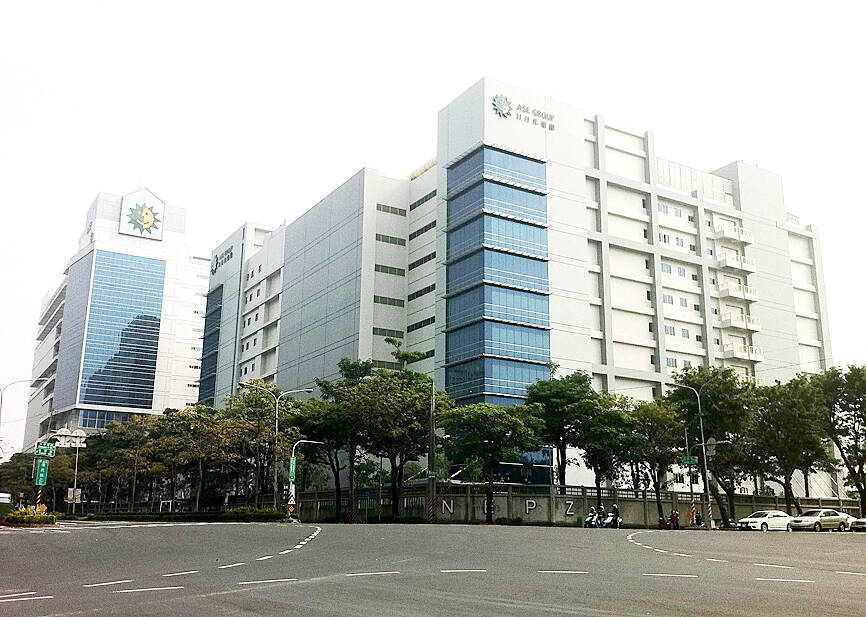ASE Technology Holding Co (日月光投控) yesterday forecast that revenue from its core chip assembly and test manufacturing business would grow by a mid-to-high single-digit percentage sequentially this quarter, due to delays in certain new product launches and customers’ stringent inventory control.
The company generated NT$76.11 billion (US$2.44 billion) in assembly and test manufacturing revenue last quarter, up 3.8 percent from the previous quarter, but down 15 percent from a year ago, ASE said.
Revenue from its electronics manufacturing service business would expand by 20 percent sequentially this quarter from NT$60.42 billion last quarter, it forecast.

Photo: CNA
The assembly and test manufacturing business’ gross margin is forecast to expand by 0.75 to 1 percentage points this quarter from 21.2 percent last quarter, on the back of higher factory utilization, ASE said, adding that factory usage would rise to average 65 percent this quarter from 60 percent last quarter.
The Kaohsiung-based company also gave a more “conservative” outlook for the second half of the year amid extended inventory adjustments by customers.
“Now most customers see soft market conditions. People are getting more cautious,” ASE chief financial officer Joseph Tung (董宏思) told an online conference yesterday. “Going into 2024, I think things will improve a bit. We are expecting much healthier growth in 2024.”
Despite challenges ahead, ASE still targets generating twice as much revenue as the rest of global semiconductor industry, excluding the memorychip sector, Tung said.
At the conference, investors expressed interest in how ASE would benefit from the recent artificial intelligence (AI) hype, but ASE said AI-related products only accounted for a low-single-digit percentage of its total assembly and test manufacturing business.
“Right now, AI is still in its early stage. It will take time for us to see growth in this segment,” Tung said.
The company would invest in this area when AI proliferates to a broader range of applications, ASE said, adding that AI is a catalyst for the next super-cycle of the semiconductor industry.
ASE said it has initiated collaboration with foundry maker United Microelectronics Corp (聯電) to produce silicon interposer wafers, which is a key part of the advanced CoWoS packaging technology used in AI chips.
Taiwan Semiconductor Manufacturing Co (TSMC, 台積電) has taken the lead in using this technology, with most jobs handled in-house, ASE said.
ASE yesterday posted a 33 percent increase in net profit to NT$7.74 billion for the second quarter, compared with NT$5.82 billion in the first quarter, thanks to higher-than-expected rush orders. On an annual basis, net profit tumbled 52 percent from NT$15.99 billion.
Earnings per share rose to NT$1.8 last quarter from NT$1.36 in the prior quarter, down from NT$3.69 a year earlier.

NEW IDENTITY: Known for its software, India has expanded into hardware, with its semiconductor industry growing from US$38bn in 2023 to US$45bn to US$50bn India on Saturday inaugurated its first semiconductor assembly and test facility, a milestone in the government’s push to reduce dependence on foreign chipmakers and stake a claim in a sector dominated by China. Indian Prime Minister Narendra Modi opened US firm Micron Technology Inc’s semiconductor assembly, test and packaging unit in his home state of Gujarat, hailing the “dawn of a new era” for India’s technology ambitions. “When young Indians look back in the future, they will see this decade as the turning point in our tech future,” Modi told the event, which was broadcast on his YouTube channel. The plant would convert

‘SEISMIC SHIFT’: The researcher forecast there would be about 1.1 billion mobile shipments this year, down from 1.26 billion the prior year and erasing years of gains The global smartphone market is expected to contract 12.9 percent this year due to the unprecedented memorychip shortage, marking “a crisis like no other,” researcher International Data Corp (IDC) said. The new forecast, a dramatic revision down from earlier estimates, gives the latest accounting of the ongoing memory crunch that is affecting every corner of the electronics industry. The demand for advanced memory to power artificial intelligence (AI) tasks has drained global supply until well into next year and jeopardizes the business model of many smartphone makers. IDC forecast about 1.1 billion mobile shipments this year, down from 1.26 billion the prior

People stand in a Pokemon store in Tokyo on Thursday. One of the world highest-grossing franchises is celebrated its 30th anniversary yesterday.

Zimbabwe’s ban on raw lithium exports is forcing Chinese miners to rethink their strategy, speeding up plans to process the metal locally instead of shipping it to China’s vast rechargeable battery industry. The country is Africa’s largest lithium producer and has one of the world’s largest reserves, according to the US Geological Survey (USGS). Zimbabwe already banned the export of lithium ore in 2022 and last year announced it would halt exports of lithium concentrates from January next year. However, on Wednesday it imposed the ban with immediate effect, leaving unclear what the lithium mining sector would do in the